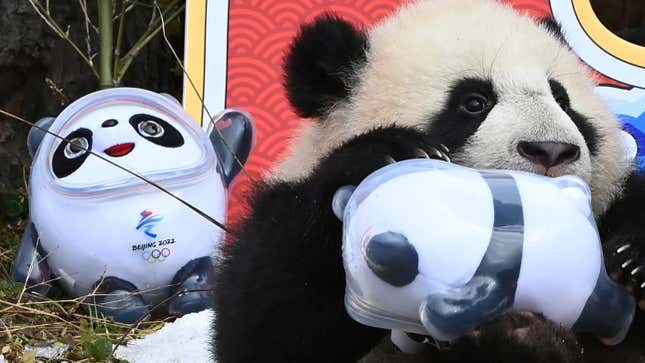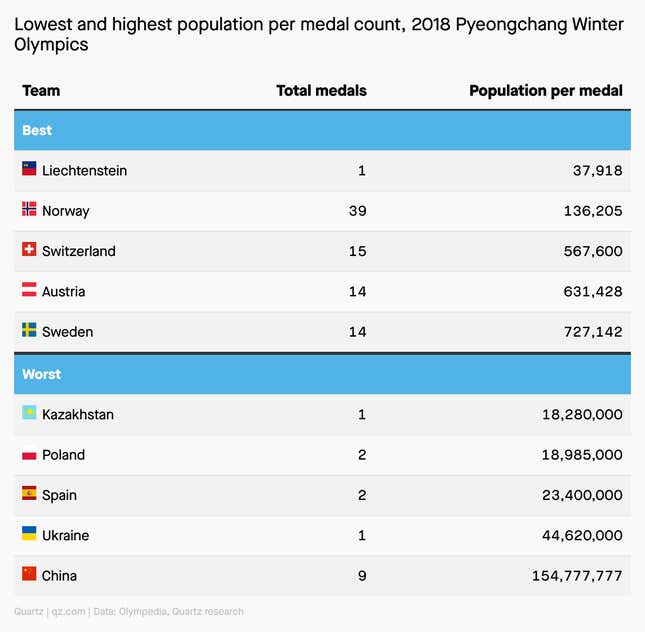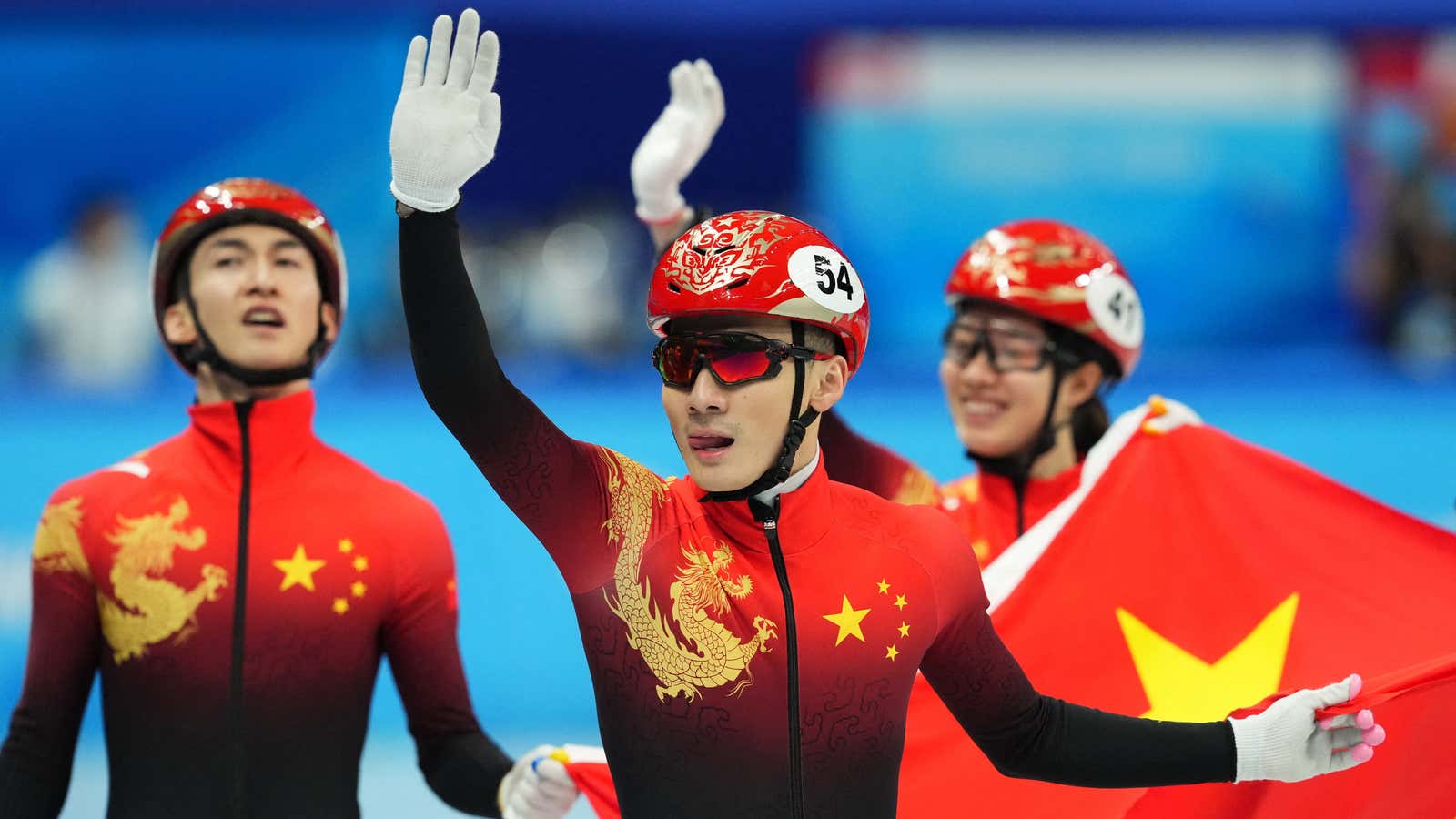Hi Olympic fans!
The first weekend of the Winter Games in Beijing was just that, a weekend of firsts. China won its first gold medal at the Winter Olympics, and did so in a brand new sport: mix-gender short-track speed skating. Plus Ryoyu Kobayashi won the men’s normal hill ski jump final for Japan’s first gold medal in the event in 50 years.
Here’s what you need to know
- The coach of Finland’s Olympic men’s hockey team accused China of violating human rights. A player on the team has been isolated in Beijing since testing positive for covid-19 more than two weeks ago.
- Australia’s Jakara Anthony took home gold in women’s freestyle skiing moguls, the first to do so for her country.
- In stark contrast to their countries’ cold relationship, mixed curling teams from the US and China hit it off and exchanged commemorative badges.
- Olympics organizers don’t expect any big changes in covid cases among athletes and Games personnel as fewer people enter the country and the closed loop stays tight.
- Germany is back on top in men’s single luge, with Johannes Ludwig winning gold in the sport and becoming the oldest person to do so.
Panda diplomacy

From a pool of over 5,800 proposals, a roly-poly panda named Bing Dwen Dwen in a high-tech ice onesie was selected as the official Beijing 2022 mascot. Notable features include a rainbow around its face to evoke technology and a heart on its left palm to signal Chinese hospitality.
Speaking to Chinese media in November, Cao Xue, who led the 14-person design team, said it was a challenge to come up with a new spin on the panda. The winning design, which came with a 100,000 rmb ($16,000) prize, underwent hundreds of tweaks over several months. Adorable giant pandas have served as diplomatic ambassadors for China for centuries—empress Wu Zetian of the Tang Dynasty sent a pair of pandas to the Japanese emperor 1,300 years ago as tokens of friendship.
A recent history of the softest representatives of soft power:
🇺🇸 1972: Giant pandas Hsinghsing and Lingling were deployed to Washington DC soon after US president Richard Nixon’s historic visit to China. The US sent two musk oxen in return.
🇫🇷 1973: Yenyen and Lili migrated to the Paris Zoological Park during French president Georges Pompidou’s term.
🇹🇼 2008: Aptly named Tuan Tuan and Yuan Yuan (“reunion” in Chinese) arrive in Taiwan as totems of reunification negotiations.
🏴 2011: Yang Guang and Tian Tian touch down in Edinburgh, a symbol of “growing friendship” between Scotland and China.
🇲🇾 2014: Malaysians welcome Fu Wa and Feng Yi, marking the 40th anniversary of diplomatic ties with the Chinese.
🇫🇮 2018: Jinbaobao and Huabao fly to Finland after then prime minister Juha Sipilä expresses support for the “one-China policy.”
🇷🇺 2019: Xi Jinping sent Ru Yi and Ding Ding to convey his “respect and trust” to Russia.
Bing Dwen Dwen was aglow at the 2022 opening ceremonies, which looked quite different from the ceremonies at Beijing’s 2008 Summer Olympics. Our latest Weekly Obsession went down a rabbit hole on opening ceremonies. We’ll be sending another before the Olympics are over about everyone’s favorite ice-smoothing machines. Hit the button below to sign up!
Winter powerhouses
The Winter Games have fewer competing countries than their summer counterparts, but the medal race is just as fierce. Two countries persistently pop up with the most wins: Germany and the US. (At the current Games, Norway and Sweden are topping the list so far). An interesting no-show among the winningest is Canada, which does well in every Winter Olympics but can’t seem to crack the top two.

But, you may be saying, do countries with large populations, like Germany and the US, have an advantage? Glad you asked! Take a look at the population-to-medal ratio:

Despite having the largest population in the world, China was only able to grab one win for every 154 million people in the 2018 Winter Olympics, which is quite a contrast to its success at recent Summer Olympics. It’s hoping to get some of that serious cold gold this time around.
❄️We’ll be back in a couple of days with fresh updates and Bing Dwen Dwen sightings. Want to get a fellow Olympic fan in on the action? Have them sign up here.
Get in touch with us at needtoknow@qz.com and live your best Quartz life by downloading our iOS app and becoming a member. Today’s email was brought to you by Morgan Haefner, Anne Quito, Amanda Shendruk, and Susan Howson.
